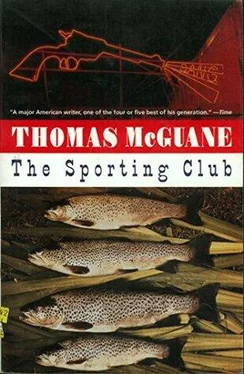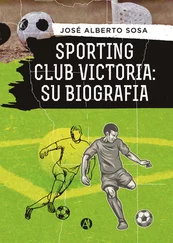“… then a funny thing happened,” Janey said, still thinking and now smoking and clicking a gold Dunhill lighter in her hand. “Vernor and I would be … I wonder … okay, Vernor and I would be walking in the street…” She went very carefully. Stanton had been getting strange, insisting that people were “cruising” him. They had to leave restaurants before they’d eaten because he had spotted people outside the window cruising him. After that — and this was all after Quinn had last seen him — he got worse. He wrote sarcastic letters to his father who was dead. He started traveling, taking Janey along, at an absurd rate, a country or two a day. One peculiar thing, a rude clerk or some tourist cruising him, as he saw it, and they had to get out. He spent less than five minutes in Spain after seeing a dwarf in a flowerprint sport shirt slumbering with a bright strip of lottery tickets pinned to his chest. “Did you see that?” he had demanded. “Did you?” They were in Gold Beach, Oregon, the next day, where Stanton couldn’t stand the smell of fish because it was an airborne river of lethal botulism. Everywhere they went, the mail mania dominated: he had to have letters. They tried Florence the year before the floods and saw men throwing treble hooks in the swollen Arno for bodies and Stanton screamed at the draggers in bad Italian demanding to know who they thought they were. That one ended with the police and jail, where Stanton couldn’t get the mail without enormous bribes once the local officials had matched his bankroll with his psychosis. Quinn thought of the letters he had planned but never written to Stanton; he saw Stanton before him in the fluorescence of advanced personal decrepitude. Janey handed him a calling card; on one side was Stanton’s name; on the other it said, “No, prisoners of love, I did not begin as a joke.” After Florence, Stanton began to invent conversations which he would write down and then memorize. He made Janey learn cues so that when people were around she could lead him from one recital to the other. She would give him one line and he would talk for five minutes and she’d give him another. Some were about Quinn. Some about Judy, the aunt; some about his father. Quinn asked what the other speeches were: a short history of the exploration of the Nile, a lecture on how the first zippers were made, instructions for building a Bessemer converter or making sourdough bread. When people got bored, he really buried them. One day, they were sitting in a German restaurant in Philadelphia and he leaned over and whispered that he could no longer move his arms and legs. They got him into a clinic right away. He called his mother in Michigan and she told him to pull himself together. He had to be watched every minute. He said his lanyard had snapped. He said his life had gotten to be so funny he couldn’t stand the laughing. He said his spring was running down and that the whole mechanism would have to be returned to Switzerland for adjustment. They carried him into the clinic like a plank and the psychiatrist attending him said that he was exaggerating the little things we all have. Quinn listened and looked on with new regard and a hopelessness that would have cleared the air if he had accepted it.
* * *
The discovery that Earl Olive was a criminal and a fugitive should have surprised nobody; but it surprised Quinn. Fortescue, visiting the ailing young businessman with an eye to enlisting his aid, bent his authoritarian spaniel face to a teletyped dossier and, scanning, gave Quinn a rapid précis of its contents: fraud, arson, assault and battery, breaking and entering, suspicion of armed robbery, suspicion of rape, suspicion of murder, known to be armed, considered dangerous. The fraud conviction began as a rape indictment, Fortescue explained, his eyes scanning another stapled pair of sheets. Earl Olive had been in the habit of calling up girls he didn’t know and representing himself as a social worker; it had been his practice to explain confidentially that they had been established as V.D. carriers and would have to be treated under state supervision. At this point, the girls were willing to accept Olive’s help: he would recommend a friend with rare type-M-positive blood who could stop the disease through sexual intercourse; the girls were eager for this simple cure; and Olive, “the friend,” would soon be at the door. It was only that the girls stayed on for more than the prescribed treatment that forced the disillusioned judge to change the indictment to the charge of fraud. Olive was convicted. He jumped bail and went on with the crimes that continued out there in the woods.
“Why don’t you call the police?” Quinn asked sensibly.
“Why do you think? Because we clean our own house here.”
“Seems pointless.”
“Does it? It doesn’t to me. There are still some of us alive for whom life in the forest means a return to older virtues, not just a vacation.”
“Very well, if you want to make a speech.”
“I mean you and your friend Stanton and the rest of your generation are just a little farther away from the founding years of this country.”
“Mm, being younger.”
“And we’re not sarcastic and we’re not facetious and damn it there are things we call valuable. What I’m saying is that we believe we can clean this Olive business up in a way that will not only be a tribute to the Centennial Club but a tribute to the country as well.”
“It sounds like you have your hands full.”
“So don’t tell me police.”
“I see now I was playing the wrong shot. Gee—”
“I’ve got equipment rolling in now, paid for out of my own pocket, I might add. I got a rack of Winchester riot guns, K-rations, rucksacks, primus stoves, hammocks, a quartermaster’s tent for extended bivouac, compasses, aerial photographs, flares, tracers.”
“Any grommets?”
“Well, the tents have grommets on their corners. What do you mean! Anyhoo, are you with us or agin us?”
“Oh, agin you, I would say.”
“Then stay out of the way. That’s an order.”
* * *
When it was dark, Quinn crept through the compound in his bathrobe, feeling a little sick and unsteady in the night. He went around and around the tent, each time cutting one more strand of the powerful guy ropes that held the tent aloft. In the vague light that came from within, the tent was a glacier. Quinn paused once in this superior task and had a giddy moment of not knowing where he was; when it came to him again, as it did immediately, he saw himself as a resistance fighter, a saboteur with ideals. Then he went on with his cutting until halfway around the tent on perhaps the fifth pass, one of the guy ropes popped; then they all went like a zipper and the great tent slumped. Quinn ran for it, running in a sick blur, as oaths and cries raged from under cloth; and by the time he was well into the woods, the riot guns were barking importantly into the night.
Back in his sickroom, the bed itself seemed to reject him like the trick-shop miniature of King Tut. Quinn thinks: I am in it hand and foot. I have suffered a relapse.
* * *
In the morning, in bed, Quinn still in Stanton’s house and posturing sickly for Janey, Charles Murray appeared. He had a bouquet wrapped in wax paper and a packet of letters. “Yoohoo,” he said, “couldn’t you hear me knocking away? I’ve been to the mail in town today—” He handed Quinn his letters, then shyly, “—these silly old—” Janey got up to get them coffee and Quinn followed her exit with forlorn eyes. He held the flowers now; they were dark orange. “How are you feeling?” Murray asked.
“Oh, all right.”
“You probably have the flu for God sakes.”
“I know, I know. But this was kind.” Quinn waved the flowers awkwardly. Murray brushed off the compliment.
Читать дальше












